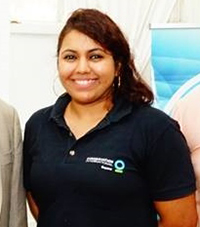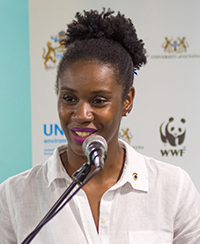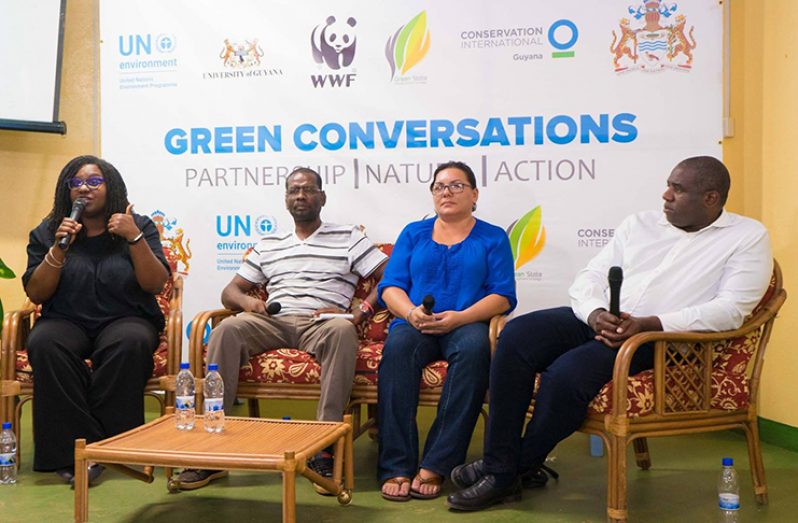Teaching Guyanese about the importance of a ‘Green’ Economy
By Gibron Rahim
The term “green economy” has become an increasingly familiar one. Yet, though the term itself has become well-known, we may still not understand how it applies to Guyana. Moreover, we may still not know how we can all personally benefit from a green economic development path. It is for these reasons that Green Conversations was created.

The Green Conversations series creates the opportunity for Guyanese to learn about green economic development and what it means to their future. Speakers in the Green Conversation series are experts in their respective fields, who deliver talks on various topics related to green economic development and tailored to the needs of communities surrounding the host capital town. Green Conversations is the result of a collaborative partnership between various stakeholders. The current series of talks are a collaboration between the Ministry of the Presidency, Department of Environment and Conservational International.
The Pepperpot Magazine spoke to Sara Bharrat, Communications Coordinator at Conservation International, and Aretha Forde, Stakeholder Management Coordinator at the Ministry of the Presidency, Department of Environment, to gain some insights into Green Conversations. Forde related that Green Conversations was conceptualised by the Department of Environment at the start of 2018 with the intention of raising awareness on the green economy concept. At that time, Guyana was set to draft its Green State Development Strategy (GSDS). In January, Conservation International hosted a TED Talk-style event with Mr. Pavan Sukhdev, President of World Wildlife Fund (WWF) International and an international banker and environmental economist, who spoke on nature capital in a natural resource-rich state. This talk set the tone for subsequent talks.

Bharrat emphasised that Green Conversations are open, non-partisan spaces for learning about the green economy. “We’ve been hearing about green development for a long time, we’ve been hearing about the green economy,” she said, “but people don’t really understand what this means to their lives in very, very material [and] tangible terms.” The intent was for Green Conversations to help to sensitise people before Green State Development Strategy (GSDS) consultations reached their areas.
According to Forde, green development refers to a model that places emphasis on sustainability, one that keeps the integrity of the natural environment in mind while protecting human health and wellbeing and ensuring economic gains. As an example, she said that in the agricultural sector businesses are encouraged to move away from inorganic fertilisers, utilise drip irrigation, and diversify their output or engage in agro-processing.
The most recent series of Green Conversations took place in the five different regional locations. Thus far, Lethem, Bartica, New Amsterdam and Georgetown have had talks.
The topics of the talks have included good governance in relation to a green economy, human capital development in the context of renewable energies and sustainable agriculture. The focus is on thinking to the future and about models for solutions Bharrat noted. “We’re not going into those spaces to rehash problems, we know what the challenges are,” she said. “We’re going there to think in a forward way.” She added that the aim is to give people the knowledge they need to begin designing their own solutions to secure the future.
In planning the current Green Conversation series it was recognised that conversations about development invariably take place in the city. “Rarely do these conversations make it outside of Georgetown and so the first mission was to ensure that we were taking the conversation to the rest of the country,” Bharrat related. This then brought up the question of which locations to include. It was decided that Green Conversations would be taken to the big towns in the administrative regions. “We were selecting townships in regions that were really hubs for people,” she stated.
The topic areas were selected based on their relevance to the people of the given regions. Berbice has traditionally depended upon agriculture. The talk in New Amsterdam focused on more efficient agricultural practices, adopting green technology and green methods and the meaning of sustainable agriculture. In the case of Lethem, Bharrat noted that Region Nine is the first region to have a draft of its plan of action for regional development in place. Governance then was a topic very relevant to Lethem. A strong green economy, or indeed any kind of economy, needs a strong governance system that understands the importance of planning, inclusive decision making and ensuring that all voices involved are heard in the decision making process Bharrat said.
Green Conversations and its topics are deeply relevant to Guyanese. Forde noted that Guyana has developed its Green State Development Strategy which outlines policy recommendations and actions to transition the country to a green state. She said, “It is the understanding that the concept of a green economy is one that is relatively new to Guyanese and given the direction in which the country is headed, it is necessary to raise awareness.” She added, “We believe that raising awareness and encouraging participation all Guyanese can be involved in moving our country along a sustainable path.”
One of the desired outcomes of Green Conversations is to help Guyanese understand that green state/sustainable development concerns are more than just environmental in nature. Bharrat explained, “It’s more than just environmental in nature in that people, and people’s decision-making processes and everything that people need are at the centre of it.” Guyana can be thought of as a puzzle or landscape. “Think about all the parts of that puzzle,” Bharrat said. She related that the process of answering the question of ensuring we have an economy and nation that is functioning and developing in a way that secures people’s wellbeing and their future while also reducing the impact of how they operate on the environment to ensure that people are making the best use of natural resources turns up numerous responses.
These include the areas of mining, agriculture, education and culture. “When you look at all these things, they’re all [a] very necessary part of a landscape and so you cannot have a green economy without first securing all of the things that people need to feel safe, well provided for, to be able to think for themselves,” Bharrat stated. She added, “A green economy is not just about natural resources, a green economy is about people and systems and holistic development.”
Another of the desired outcomes of Green Conversations is to build the capacity of the Guyanese people to participate effectively in green/sustainable development conversations. The bottom line is simple related Bharrat. “[The bottom line] is that people at least come out of that room having a better understanding of what green development really means,” she stated. Moreover, she said, a further goal is that they understand a bit more about their place in green development and hopefully, having gotten that information and internalised it, can go to green development conversations with more capacity than they had before to join the national conversation and produce ideas and influence end results.



.jpg)








